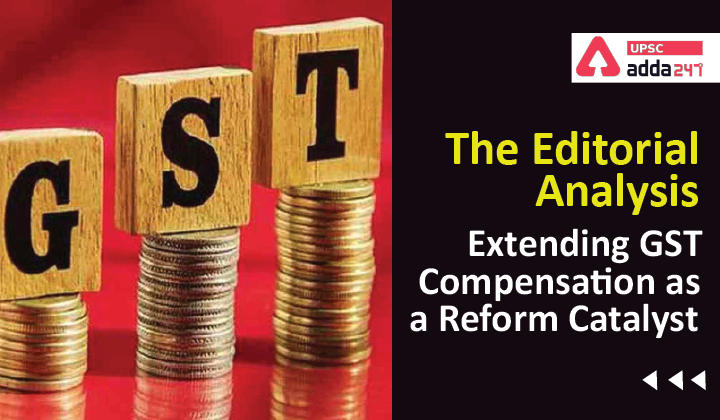Table of Contents
Extending GST Compensation as a Reform Catalyst- Relevance for UPSC Exam
- GS Paper 2: Indian Constitution- Federalism
- Functions and responsibilities of the Union and the States,
- Issues and challenges pertaining to the federal structure,
- Devolution of powers and finances up to local levels and challenges therein.
Extending GST Compensation as a Reform Catalyst- Background
- It has been claimed that the implementation of the Goods and Services Tax (GST) in India was a grand experiment in cooperative federalism.
- GST Regime involves the participation of both the Union and the States to rationalize cascading domestic trade taxes and evolve a value-added tax on goods and services.
Goods and Services Tax (GST) Council
Extending GST Compensation as a Reform Catalyst- Key Points about GST Regime
- Compensation provision: To allay the fears of States of possible revenue loss, the Union government promised to pay compensation for any loss of revenue in the evolutionary phase of five years.
- The compensation was to be calculated as the shortfall in actual revenue collections in GST from the revenue the States would have got from the taxes merged in the GST.
- This was estimated by taking the revenue from the merged taxes in 2015-16 as the base and applying the growth rate of 14% every year.
- GST Compensation Cess: It was levied by the Union Government in order to finance the compensation requirements of the states.
- it was levied on certain items such as tobacco products, automobiles, coal and solid fuels manufactured from lignite, pan masala and aerated waters.
- Covid-19 and GST: COVID-19 pandemic led lockdown in the country resulted in the loss of revenue to States, estimated to be at ₹3 lakh-crore.
- ₹65,000 crores was expected to accrue from the compensation cess.
- Of the remaining ₹2.35 lakh-crore, the Union government decided to pay ₹1.1 lakh-crore by borrowing from the Reserve Bank of India under a special window and
- the interest and repayment were to be paid from the collections from compensation cess in the future.
National Youth Festival 2022- PM to Inaugurate 25th National Youth Festival
Extending GST Compensation as a Reform Catalyst- Issues with GST Regime
Although it was hoped that the tax structure would stabilize in the first five years, the reform is still in transition. Few issues are mentioned below-
- Adverse Revenue Collection: The technology platform could not be firmed up for a long time due to which the initially planned returns could not be filed.
- This led to large-scale misuse of input tax credit using fake invoices.
- The adverse impact on revenue collections due to this was compounded by the pandemic-induced lockdowns.
- Covid-19 Impact: Covid pandemic resulted in more spending by states on saving lives and livelihoods of people and less revenue generation due to covid led lockdowns.
- GST as their major source of revenue declined significantly during the covid period and mechanisms to compensate states need to be put in place.
- GST Compensation Cess: The agreement to pay compensation for the loss of revenue was for a period of five years which will come to an end by June 2022.
- In the backdrop of the covid pandemic, this further weakens the economic position of the states.
- considering the uncertainty in revenue collections, States are demanding that the compensation scheme should continue for another five years.
- Complex GST regime: the present GST structure is far too complicated with four main rates (5%, 12%, 18% and 28%).
- This is in addition to special rates on precious and semi-precious stones and metals and cess on ‘demerit’ and luxury items at rates varying from 15% to 96% of the tax rate applicable.
Draft National Air Sports Policy | NASP 2022
Extending GST Compensation as a Reform Catalyst- Way Forward
- Boosting the revenue potential of the states: GST Regime needs to reform with the cooperation of the states and also extend the tenure of the GST Compensation cess to help states in meeting their commitments to people in these difficult times.
- Broadening the tax base: Notably, almost 50% of the consumption items included in the consumer price index are in the GST exemption list.
- it is necessary to bring petroleum products, real estate, alcohol for human consumption and electricity into the GST fold.
- Simplifying the GST Tax regime: Reforming the structure to unify the rates is imperative and this cannot be done without the cooperation of States.
- This can be done by continuing the compensation payment for the revenue loss to states. A simplified GST regime will have the following benefits-
- Enhance the buoyancy of the tax in the medium term
- Reduce administrative and compliance costs to improve ease of doing business and minimize distortions.
- Linking the Compensation with SGDP: the rate of growth of reference revenue for calculating compensation can be linked to the growth of GSDP in States.
- This will ensure the comfort of minimum certainty on the revenue.
- This will also incentivize states to accomplish the reform in the true spirit of cooperative federalism.`
- This can be done by continuing the compensation payment for the revenue loss to states. A simplified GST regime will have the following benefits-
Goods and Services Tax (GST) Council




 TSPSC Group 1 Question Paper 2024, Downl...
TSPSC Group 1 Question Paper 2024, Downl...
 TSPSC Group 1 Answer key 2024 Out, Downl...
TSPSC Group 1 Answer key 2024 Out, Downl...
 UPSC Prelims 2024 Question Paper, Downlo...
UPSC Prelims 2024 Question Paper, Downlo...




